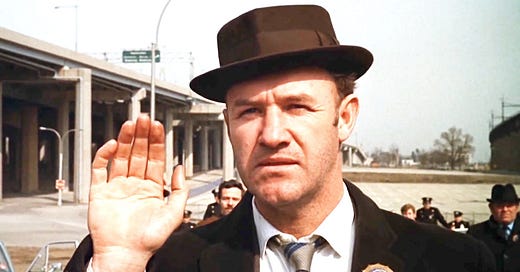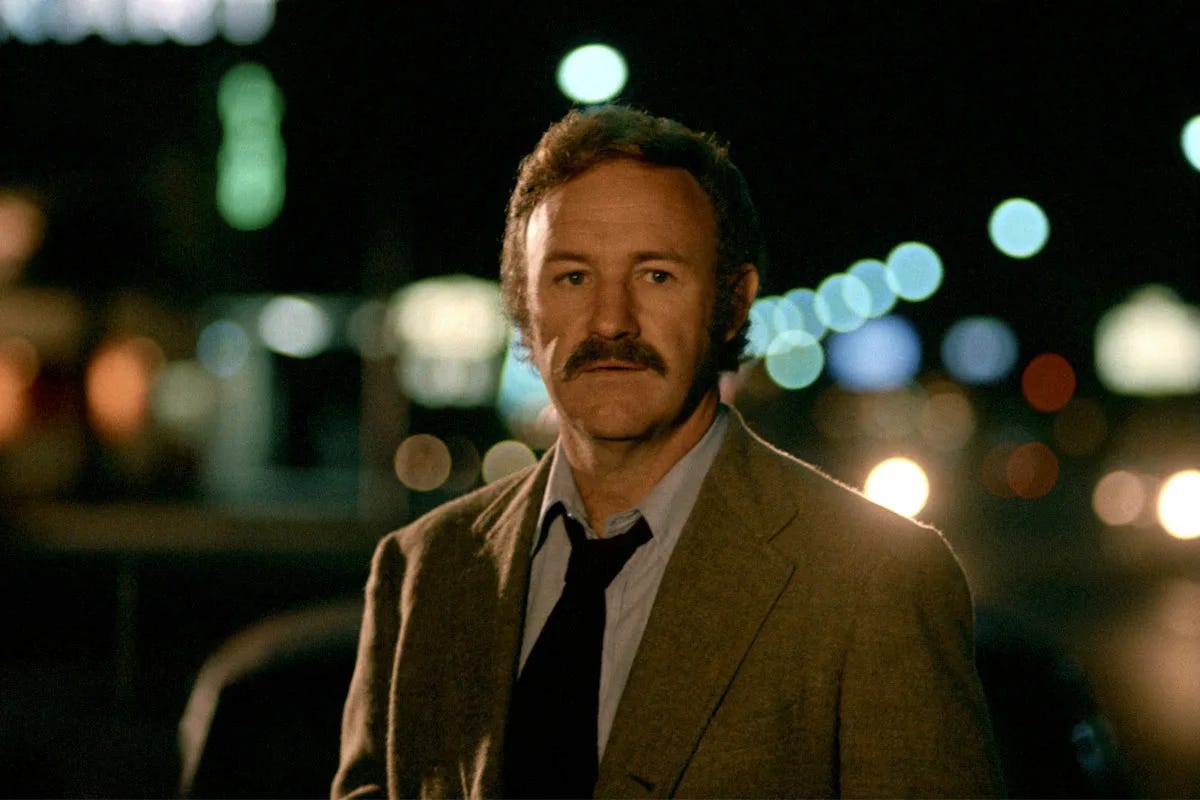
Gene Hackman: The Best of the Bastards
The Oscar-winning actor played a wide range of characters, but he excelled at one particular kind.
Gene Hackman passed away last week at the age of ninety-five. There are still questions surrounding his death and the death of his wife, concert pianist Betsy Arakawa, although there doesn’t appear to be foul play. As investigators examine what happened, fans of Hackman’s work have shared their love of his performances. What jumped out was that there was no shortage of options: Bonnie and Clyde, The French Connection, Prime Cut, The Conversation, Young Frankenstein, Night Moves, Superman, Hoosiers, No Way Out, Mississippi Burning, Unforgiven, The Firm, The Quick and the Dead, Crimson Tide, Get Shorty, The Birdcage, and The Royal Tenenbaums still don’t cover all his great work.
For me, it’s not only the breadth of Hackman’s performances, but that no one could play a bastard as well as him. That’s not to say that Hackman only played one kind of character, but when he was playing a bastard, no one else in cinema history could do it as well or with so many different levels. Not only did he always retain movie star charisma, but he found the nuances in his characters that made them compelling even at their most repulsive.
Fittingly, Hackman won his first Oscar for playing Jimmy “Popeye” Doyle, a racist New York City narcotics officer tracking a shipment of heroin into the United States. Similar to later law enforcement characters he would play like John Herod in The Quick and the Dead and “Little Bill” Daggett in Unforgiven (the latter earning him his second Oscar), Popeye’s actions aren’t so much about how the end justifies the means, but rather how his penchant for violence and sadism frequently threatens to spill over into public, revealing that he foments more chaos under the auspices of creating order. He’s a thug who imagines himself a warrior king, and Hackman dances on the tightrope playing a man almost entirely devoid of self-doubt or perhaps even self-awareness.
And yet not all Hackman bastards were villains. He could just as easily play the role with a flourish of charm and charisma, as in The Firm or The Royal Tenenbaums. As his character Royal in The Royal Tenenbaums breezily explains, “I've always been considered an asshole for about as long as I can remember. That's just my style.” Whether he was leaning into being a jerk or upending audience expectations, Hackman always knew how to find the pathos in his character without overdoing it. There is just as much power in Royal comforting his grieving son as there is in the sadistic Little Bill saying, “I don't deserve this... to die like this. I was building a house.”
We often think that if an actor returns to the same kind of character that means they must not have a lot of range, or that they’ve gotten too comfortable. For Hackman, he seemed just as eager to find new colors and tints on bastards in the 90s as he did in the 70s. Films could, and did, use him to play a straight heavy, but he wasn’t interchangeable with his peers. When you got Gene Hackman, that meant something, and it added a richness to your movie that wasn’t automatically present on the page or even in the direction. He made these characters his own, and in turn, became one of cinema’s most indelible performers.
Recommendations
I was kind of stunned by how much The New York Times (or at least its political coverage) has become inseparable from something you’d see in USA Today. The latter paper used to catch a lot of flack for being so graphics-based, but NYT recently ran a little graph about the “importance” of Trump’s recent actions, and I’m not exactly sure why anyone should take The Grey Lady seriously at this point when it comes to politics. Read them for a deep-dive investigative piece or their other areas of coverage, but as Parker Molloy points out, this is a paper that cannot stop whining about trans people existing and then says anything that affects them is no biggie.
Also, if you haven’t subscribed to The Reveal yet, you really should. They recently attended the True/False Film Fest, a festival entirely of documentaries, and one I’d love to attend personally one day (maybe if this newsletter ever gets big enough, we can make that happen). I love the insights Scott Tobias has here about some of these documentaries running up against our current political moment and how anodyne ones seeking uplift like the upcoming Sally (about astronaut Sally Ride) will likely fall flat when confronted with the reality of 2025. Still, there are titles he saw that will remain on my radar, like Predators and Zodiac Killer Project, which also received positive notices when they played at Sundance.
Paramount is running a big sale on some of its 4K titles right now. Once Upon a Time in the West is a masterwork of the genre, one of Sergio Leone’s best movies, and features a stunning performance from Henry Fonda playing against type. At only $14.49 (44% off), you should add this 4K to your collection.
Note: I receive a small percentage of sales made through my Amazon Associates links.
What I’m Watching
When Hackman passed, I decided to come back to Night Moves, a film I hadn’t seen since college. In the film, Hackman plays Harry Moseby, a former football player turned private investigator who’s tasked with finding the wayward daughter of a wealthy widow. I watched the film with my dad, and as he noted, the film is extremely 1970s, and that’s true! It’s hard-bitten, cynical, and uses its neo-noir trappings to go even darker than its noir forebearers. But it’s still a captivating film about a guy whose work means destroying the kind of domesticity he desires. That creates a fascinating tension at the center of the movie, and Hackman effortlessly plays the paradoxical Moseby. The film arrives in The Criterion Collection at the end of the month.
What I’m Reading
Ben Stiller on Gene Hackman’s Simple Truth by Ben Stiller [The New York Times] - This is a fascinating article about what it was like for Stiller to work with one of his idols on The Royal Tenenbaums. When Stiller confesses that his favorite Hackman performance was in The Poseidon Adventure, Hackman simply replies, “Money job.” While that may seem rude, Stiller, having the benefit of both working with Hackman and seeing his movies, thinks that it wasn’t a brush-off, but perhaps that Hackman couldn’t help but give great performances regardless of why he took the role. There’s some wisdom there as plenty of actors take roles because they pay well enough, but the greats still show up to work (see also Nicolas Cage). You can’t say Hackman phoned it in, and while Stiller likely wanted to hear fond reminiscences of working on The Poseidon Adventure, I look at that moment as Hackman talking to a peer rather than a fan.
What I’m Hearing
My wife and I watched the stunning new 4K of Amadeus this past weekend, and so naturally I’ve been listening to Mozart while I work, specifically this album:
What I’m Playing
I finished the main story in Dredge, and I liked playing the game enough to get the DLC. While it’s not exactly the game that gives my PlayStation 5 a workout (you could play this on a Switch and not lose any technical fidelity), I find it fairly relaxing, and a nice way to keep my mind occupied rather than doomscrolling on my phone.
My current plan is to play the Dredge DLC, go back to The Last of Us Part II Remastered to get the rest of the trophies before the new season of the HBO series drops on April 13th, and then I’m very curious if Clair Obscur: Expedition 33 will be as good as it looks.













